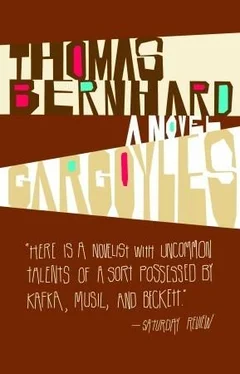He was now prepared to go on working for years. Possibly the work would destroy him. Then: “No,” he said, “I won’t let myself be destroyed.”
Then he spoke of his current business affairs, which were focused more and more on the African countries. He had received the most gratifying news from London and Capetown, he said. Africa was developing at tremendous speed into the richest continent in the world, and it was essential to exploit the fact that the whites were withdrawing from it. “The white race is done for in Africa,” he said, “but I am just beginning there!”
Coming back to his writing, he said that right now, “these past few weeks,” he had made discoveries that were decisive for his work. His isolation, “the emptiness here,” was enabling him “to reach out to a whole tremendous cosmos of ideas.” Now everything was coming to fruition inside him. And he was mustering all his strength to complete his work.
In order to have nothing around that might interfere with his work, he said, he had ordered destroyed “the last real distraction I have had in Hauenstein.” He had ordered all the game that still remained in his forests to be shot, collected, and distributed preferably to “the poorest people” in the whole vicinity.
“Now I no longer hear anything when I open the window,” the industrialist said. “Nothing. A fabulous state of affairs.”
After a prolonged silence in the room I heard my father speak of me to the industrialist, saying that I had come home for the weekend from Leoben, where as the industrialist knew I was studying at the Mining Academy, and he had taken me on his rounds this morning. I was outside in the corridor now. But the industrialist was not tempted to call me in. “No,” he said, “I don’t want to see your son. A new person, a new face, will ruin everything for me. Please understand, a new face would ruin everything for me.”
The industrialist asked my father where he had been that day. It sounded like a routine question that he always asked.
“In Gradenberg,” my father said. “An innkeeper’s wife there was killed by a miner named Grössl. Then we were on the Hüllberg. And in Salla. And in Köflach. In Afling and Stiwoll.”
“Are you going up to Saurau now?” the industrialist asked.
“Yes,” my father said, “but before that I have to go down to the Fochler mill again.”
“No,” the industrialist repeated, “I prefer not to receive your son; I’d rather not meet him. When a new person suddenly turns up, it may be that he’ll destroy everything for me. Just one person turns up and ruins everything.” After a while the industrialist said: “Since all the rooms in this house are completely vacant, I cannot knock into any object in the darkness that fills them.”
My father emerged. We went down to the vestibule. The industrialist’s half-sister let us out. Even the clearing had something oppressive about it. “We’ll drive to Geistthal for a bit,” my father said. In silence we drove through the woods along the same road by which we had come, back to Geistthal. We did not see a soul. I was appalled, imagining that there was no longer any game in the forest and that invisible sentinels were watching us. Shortly before we reached Geistthal, we saw the first people. It was noon. At first we thought to drive to the Fochler mill by way of the Römaskogel, but then after all drove by way of Abraham to Afling, where we went to a restaurant that my father knew well.
All the tables were occupied. We were invited to come into the kitchen, where we were given preferential service. We heard talk about the killing in Gradenberg, and about the dead woman. Grössl had not been caught yet. But his hiding place couldn’t be far away, someone said; sooner or later hunger would drive him into the open.
While we ate, my father again talked affectionately about the child in Hüllberg, then about Bloch. “They’re all problems,” he said. He opened his medical bag and saw that he had forgotten the books he had wanted to borrow from Bloch, the Diderot, the Nietzsche, and the Pascal. But anyway, he remarked, he would not have a chance to do any reading in the next few days. Frau Ebenhöh was taking much of his time. But the habit of visiting her would end soon, for she had only a few more days to live, would surely simply fall asleep. Then he began talking about the schoolteacher, the first person he had visited that morning, who had died under his hands. The fate of country schoolteachers was bitter, he said. So often they came from a town, no matter how small a one, where they felt easy, into a grim mountain community where everyone was hostile to them. Such transfers were usually made as a punishment. The teachers would lead a more and more wretched, depressed life, all the more hamstrung by the hateful regulations issued by the Ministry of Education. Most of them lapsed fairly soon into an apathy that might at any moment turn to madness. In any case they were people all too prone to regard life as a penance. But now, constantly in surroundings where they were not taken seriously, looked down on by everyone, their initially weak intellects were torn to shreds and they stumbled into sexual aberrations.
For the longest time, my father said, the sad fate of the Salla schoolteacher had preyed on his mind. But he did not want to talk about that case, he said. As soon as these words were out of his mouth, he apparently ceased to feel any need for secrecy, for he went on to say that in the Obdach grammar school there had been a scandal over the teacher’s relations with a nervous boy , and the poor fellow had had to leave his post. He sought refuge in the Tyrol, then in Italy, and finally in Slovenia. For two full years, the man had lived like an outlaw, moving among people of foreign speech and subsisting mostly on small thefts. Then he had suddenly come back across the frontier, totally deranged, and had given himself up to justice. He was quickly brought to trial, and the court in Brock sentenced him to two years in jail and two additional years in a milder house of correction. He served his sentence in Garsten. Released (I thought of Frau Ebenhöh’s brother), he had returned to his parents, who owned a small farm in Salla and who had nursed him lovingly. “Of course you could say that the teacher died of heart disease, of a so-called cardiac rupture — you could make it that simple,” my father said. “But it wasn’t that.”
In the dying teacher’s face my father had clearly seen, he said, a man’s accusation against a world that refused to understand him.
The poor fellow had been twenty-six years old. His parents had had his shroud hanging up in the vestibule for weeks beforehand. “For weeks,” my father said, “whenever I entered the house, the first thing I saw was his shroud.”
The family had been relieved that he had died in the doctor’s presence. They too, like Frau Ebenhöh in Stiwoll, must have regarded their son as a terrible punishment (from God?), my father said.
While we ate, my father also told me the following story about the deceased teacher. Once when he was a boy, his grandmother had taken him along into the deep woods to pick blackberries. They lost their way completely, wandered for hours, and could not find the way out of the woods. Darkness fell, and still they had not found the path. They kept going in the wrong direction all the time. Finally grandmother and grandson curled up in a hollow, and lying pressed close together, survived the night. They were lost all the next day and spent a second night in another refuge. Not until the afternoon of the second day did they suddenly emerge from the woods, only to find they had all along gone in a direction opposite from that of their home. Totally exhausted, they had struggled on to the nearest farmhouse.
Читать дальше












